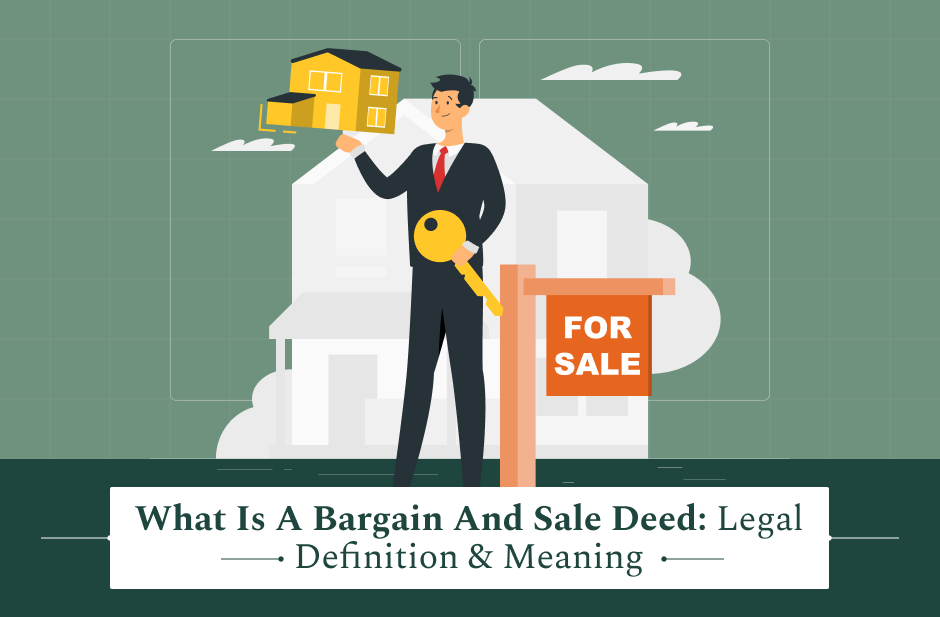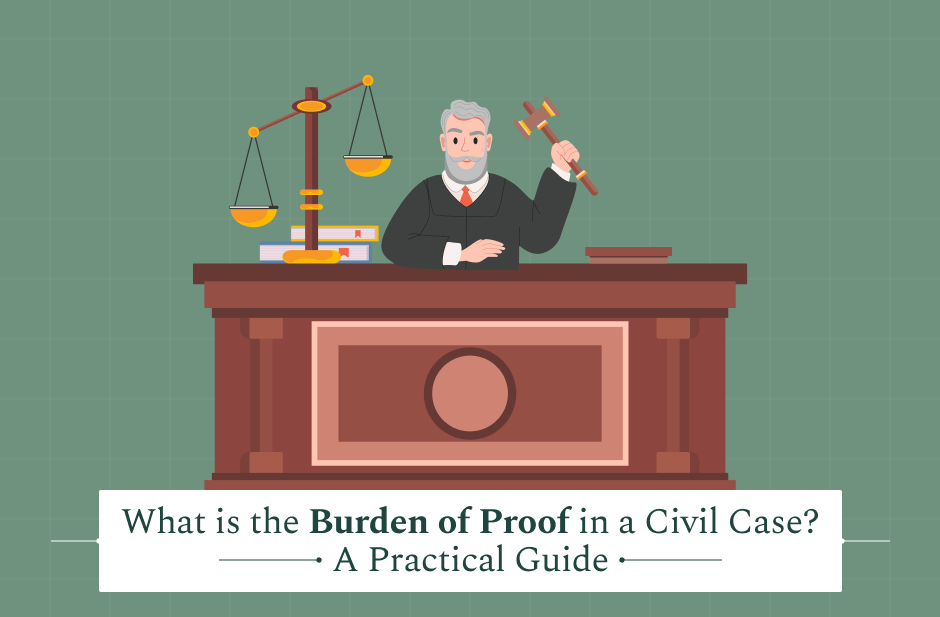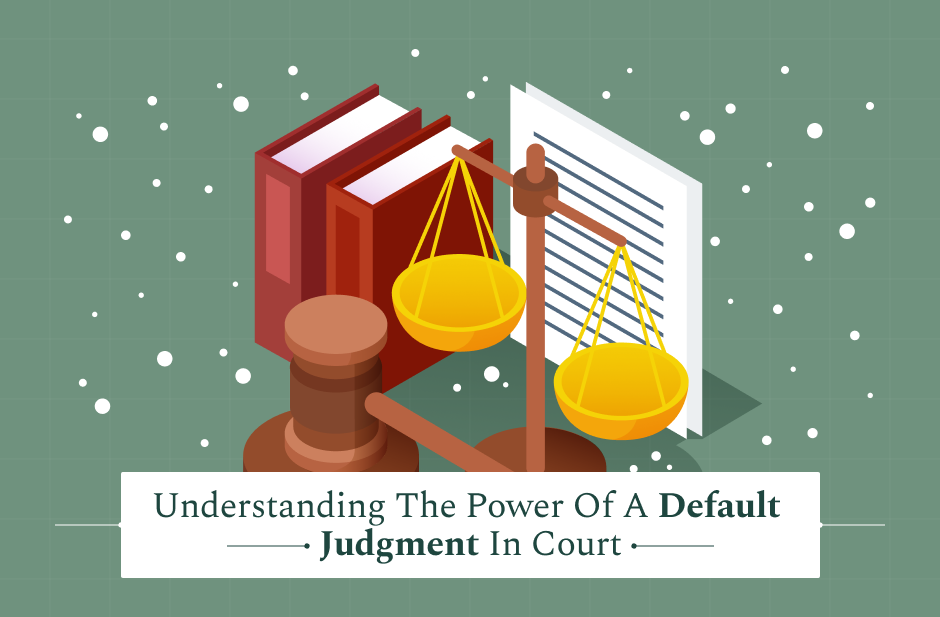When purchasing or selling real estate, one of the most significant documents involved is the deed. A deed is more than just a piece of paper; it is the legal instrument that indicates ownership has transferred.
However, not all deeds are created equally. Some provide buyers greater protection while others place more liability on the purchaser.
A type of deed that frequently causes confusion is the Bargain and Sale Deed. Compared to warranty deeds, which provide great assurances to purchasers, this deed provides more limited protection.
It is important to understand if you are buying or selling property, especially in states like New York and New Jersey that regularly utilize this type of deed.
In this article, I will talk about the following things:
- What is a bargain and sale deed?
- Types of bargain and sale deed.
- What are the key elements in a bargain and sale deed?
- How does it work?
- What is the legal impact of such a deed?
Additionally, I will also talk about some of the questions that most people often ask about such a deed. Therefore, if these are some of the things that you want to know, keep reading till the end…
What Is A Bargain And Sale Deed?
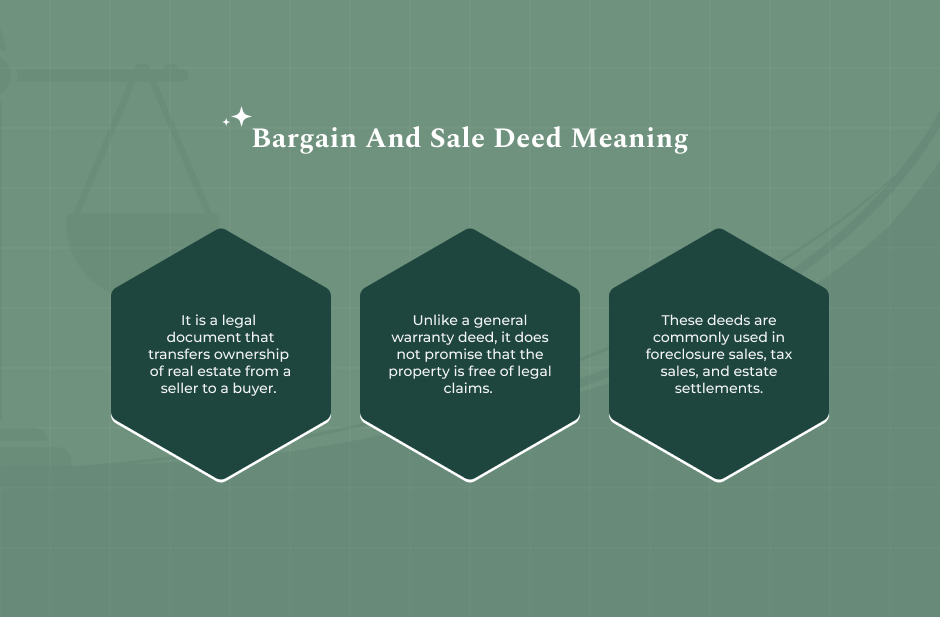
A Bargain and Sale Deed is a document that can transfer ownership of a property from a seller (the grantor) to a buyer (the grantee).
According to Practical Law by Reuters, it is a “form of deed that transfers fee title and legal interests in real property from the grantor to the grantee.”
The deed states that the seller does own the property and has the ability to sell it, but does not guarantee that the title is free and clear of defects, liens, or claims. It can be considered to fall in between a quitclaim deed (which gives the buyer no warranties) and a warranty deed (which provides full protection to the buyer).
For example, if you purchase a house using a Bargain and Sale Deed, the seller is essentially saying, I own this property and I am selling it to you, but if there is any issue over title after you take possession (for example, an old tax lien), that is now your issue and no longer mine.
According to Cornell Law School’s Legal Information Institute, a Bargain and Sale Deed usually contains no warranties against encumbrances, unless the grantor provides a specific covenant against their acts.
What Are The Types Of Bargain And Sale Deed?
Bargain and Sale Deeds come in a few variations, depending on how much protection they provide:
Standard Bargain And Sale Deed (Without Covenants)
Firstly, there comes the standard one, which is without covenants. It offers the least protection. In such a deed, the seller transfers ownership but makes no promises about liens, encumbrances, or claims. These are commonly used in:
- Foreclosure sales.
- Tax sales.
- Estate settlements.
Bargain And Sale Deed With Covenants
Secondly, the Bargain and Sale Deed With Covenants provides limited guarantees, but is better than the first one. In this kind of deed, the seller promises they haven’t done anything during their ownership that would harm the property’s title.
The deed protects the buyer against claims caused by the seller but not against issues that existed before the seller owned it.
Special Bargain And Sale Deeds
Finally, there are special bargain and sale deeds. Sometimes, these are tailored for unique transactions, such as when government entities or trusts transfer property.
Note: In states like New Jersey, Bargain and Sale Deeds with covenants are the most common form of deed in residential sales.
What Are The Key Aspects Of A Bargain And Sale Deed?
A bargain and sale deed simply means the seller of the property is the only one with title and the right to convey the title.
Bankrate states that these deeds convey no warranties or guarantees to the buyer against claims or liens against the property, which means the buyer could be responsible for those claims if they arise.
If you’re dealing with this type of deed, here are the essential aspects to keep in mind:
- Ownership Transfer: It confirms the seller owns the property and transfers it to the buyer.
- Limited Guarantees: Unless covenants are added, it doesn’t protect against past title issues.
- Buyer Risk: The buyer may inherit problems like liens, unpaid taxes, or claims from previous owners.
- Use in Specific Transactions: Often used in foreclosure sales, where banks or government agencies sell property “as is.”
For example, the New York State Bar Association explains that foreclosures often involve Bargain and Sale Deeds without covenants, since lenders don’t want to be liable for prior title issues.
How Does Beyond Bargain And Sale Deed Happen?
According to Trust & Will, it “includes a warranty stating that the grantor has title to the property.” Therefore, they are the rightful owner and are entitled to sell it. There are no other owners who may claim ownership of the property. The deed does not, and cannot, ensure the property is free from any claims.
While Bargain and Sale Deeds serve important functions in some transactions, many real estate deals go “beyond” them when parties seek a more substantial warranty.
- General warranty deed: This deed provides the ultimate protection for buyer and seller because it covers the entire chain of ownership and protects buyers against any hidden defects or issues in the title before the seller owned the property.
- Special warranty deed: This deed is limited to only the time period the seller owned the property, so it does not afford increased protection for the buyer as compared to a Bargain and Sale Deed, but not as extensive as a warranty deed.
- Quitclaim deed: This deed provides the least amount of protection to the buyer and is often used when transferring property to family.
For example, it is preferable to use a warranty deed to buy a family home, whereas you may find a Bargain and Sale Deed more typical in auction or government transactions.
Read Also: What Is Breach Of Contract: Legal Definition & Meaning
What Are The Legal Impacts Of A Bargain And Sale Deed?
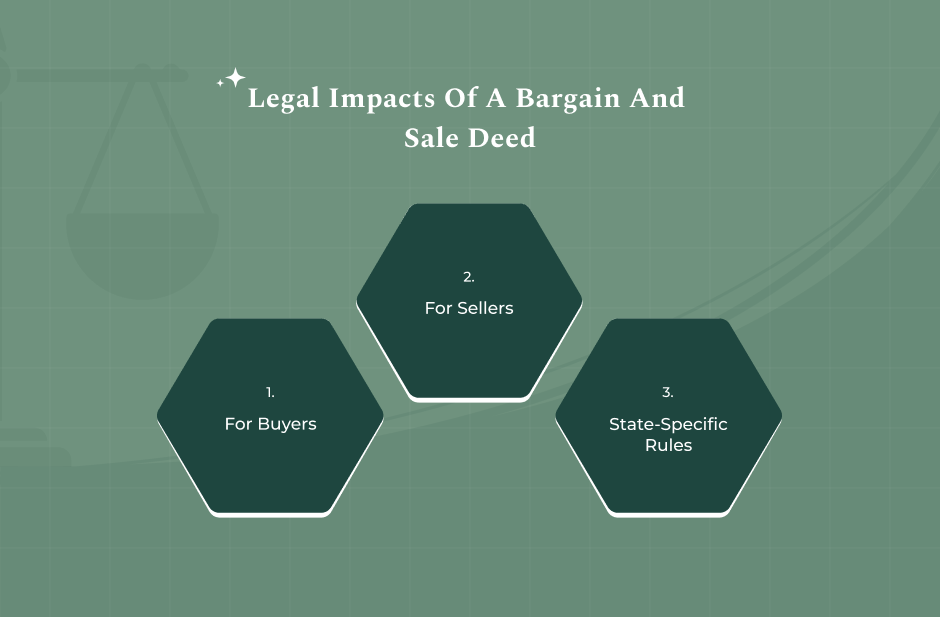
The legal consequences of using this deed are important for both buyers and sellers:
1. For Buyers:
You take on more risk compared to a warranty deed. Title insurance becomes almost essential to protect against unknown claims. Additionally, you might have to deal with unpaid taxes, liens, or judgments attached to the property.
2. For Sellers:
You have fewer legal responsibilities after the sale. This can be useful in cases where the property is being sold as part of a foreclosure or estate liquidation.
3. State-Specific Rules:
According to the American Bar Association, some states, such as New Jersey and New York, commonly use Bargain and Sale Deeds, while others rely more on warranty deeds.
Note: According to Nolo, courts generally enforce Bargain and Sale Deeds as written, which is why buyers should carefully review and seek legal advice before accepting one.
Frequently Asked Questions (FAQs):
Here are some of the questions that people also ask about when it comes to a bargain and sale deed. Take a look at them before you leave:
It can be safe if you obtain title insurance and have an attorney review the title. Risks may exist if you do not do either of these things.
Bargain and Sale Deeds are very common in New York, New Jersey, and sometimes during a foreclosure or tax sale in the U.S.
A warranty deed guarantees the property is free of title defects, while a Bargain and Sale Deed does not include that warranty.
Yes, as a buyer, you have a right to negotiate the deed type, but in foreclosures and government sales, sellers may not be willing to change the deed type.
Yes, the best practice is to obtain title insurance to protect against potential title disputes.








